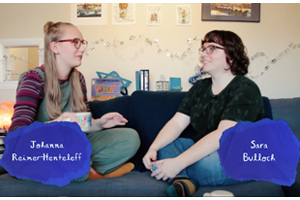Local News
Tarbut to present film about what it means to be Jewish in Winnipeg

By BERNIE BELLAN In the October 27 issue of the JP&N, within our preview of Tarbut, we had a blurb about a film that will be shown Sunday evening, November 14, at 7:30 pm in the Berney Theatre.
Here is what the blurb said:
“Ma Nishma Manitoba”
Hot off a highly successful premiere at Gimli Film Festival 2021 – this, playful, funny, and evocative documentary by two local Jewish filmmakers explores the history of Jews in Winnipeg –
the complex, diverse, and dynamic experience of the current Jewish community and what exactly it means to be ‘Jewish enough’.
Through interviews with a Rabbi, a politician, a musician, a student, and others; combined with joyful graphics, archival footage, and animation; the film explores questions of identity, spirituality, family, inclusivity, creativity, and a range of perspectives on Israel.
Q & A following the film with the filmmakers Sara Bulloch and Johanna Reimer – Henteleff
We had the opportunity to view the film prior to Tarbut. It was interesting seeing a film about what it means to be Jewish in Winnipeg in 2021 presented from the perspectives of various individuals, each of whom had quite a different contribution to make.
I asked the two women filmmakers to give me some information about their backgrounds. Here is what they wrote me:
From Johanna Reimer-Henteleff: “I started making films with my friends in late high school, which ended up being really fun and I wanted to pursue it further! So, I attended OCADU in Toronto and during my time there I mainly focused on video art, installations, and documentary filmmaking. Since I’ve been back in Winnipeg my main focus has been freelance videography and production assistance. I’ve also gotten more into animation and illustration work since working on Ma Nishma, which has been super cool to experiment with, and I’m hoping to work on more independent film projects in the future! “
From Sara Bulloch: “I have a Bachelor of Commerce from the University of Manitoba, and a Creative Communications diploma majoring in media production with Red River College. Have also taken several workshops related to film production here and there. Lot of my filmmaking skills are self taught though. I currently work as an editor with Farpoint Films, while also working on independent film projects.”
Using some fast paced editing techniques that kept the film from turning into a series of long excerpts from different interviews – which would have bogged the film down (as so many documentaries used to do until such well known filmmakers as Ken Burns and Michael Moore radically changed documentary filmmaking), Ma Nishma Manitoba is quite delightful – but not without its share of controversy.
One of the subjects in the film, Lasha Mowchun, is someone about whom I wrote back in 2016 when I encountered her outside the Negev Gala that year when she part of a group protesting the Jewish National Fund. Having Lasha offer her rather critical views on Israel during this film is something that may offend some members of our community, but I applaud Sara and Joahnna for wanting to show viewers of the film different facets of the community.
What the film also does quite nicely is explore the family histories of the film’s subjects, using old photographs and some excellent archival footage. Historian Dan Stone gives a good overview of how Eastern European Jews ended up coming to Winnipeg in droves, while Rabbi Allan Finkel delves into his own family’s history, including his mother’s experience during the Holocaust. As well, Allan explains how his own departure from Judaism, followed by a more recent reawakening, is something that resonates with many Winnipeg Jews.
Also interviewed in the film is Yude Hentelef. Having representatives of different generations talk about their respective understandings of what it means to be Jewish in Winnipeg certainly lends a proper balance to the film.
I have to admit though that I was rather surprised to see how much time is devoted to interviewing Leah Gazan, who is the NDP Member of Parliament for Winnipeg Centre. I’ve written about Leah several times myself, but each time I was careful to point out that, although Leah had a Jewish father, her mother was Lacotah-Chinese, and Leah identifies as an Indigenous woman.
In fact, this film would fit in well with the ongoing discussion we’ve had within the pages of this newspaper about how difficult it is to establish a clear Jewish identity for so many individuals nowadays. A good portion of the film deals with questions about what are the essential characteristics of Jewish identity – especially for young people.
And, of course, what would a film about Jewish identity be without a healthy portion devoted to a discussion of the pivotal role that food plays in so much of Jewish life? Ma Nishma Manitoba certainly does that, yet it’s hard to accept that Jewish identity can be preserved if its principal characteristics are certain foods, having a sense of humor, and believing in “tikkun olam”.
Still, with its clever use of graphics and lighthearted approach to much of its subject matter, Ma Nishma Manitoba is thoroughly enjoyable – and enlightening.
Local News
Thank you to the community from the Chesed Shel Emes

We’re delighted to share a major milestone in our Capital Campaign, “Building on our Tradition.” Launched in November 2018, this campaign aimed to replace our outdated facility with a modern space tailored to our unique needs. Our new building is designed with ritual at its core, featuring ample preparation space, Shomer space, and storage, creating a warm and welcoming environment for our community during times of need.
We’re grateful to the nearly 1,000 generous donors who contributed over $4 million towards our new facility. A $750,000 mortgage will be retired in November 2025, completing this monumental project in just seven years.
We’re also thrilled to announce that our Chesed Shel Emes Endowment Fund has grown tenfold, from $15,000 to $150,000, thanks to you, the Jewish Foundation of Manitoba’s FundMatch program, and Million Dollar Match initiative in 2024. Our fund helps ensure that everyone can have a dignified Jewish funeral regardless of financial need.
As we look to the future, our goal remains to ensure the Chevra Kadisha continues to serve our community for generations to come. Our focus now shifts to replenishing our savings account and growing our JFM Endowment fund.
We’re deeply grateful for your support over the past several years.
It’s our privilege to serve our community with care and compassion.
With sincere appreciation,
Campaign cabinet: Hillel Kravetsky, Gerry Pritchard, Stuart Pudavick,
Jack Solomon, and Rena Boroditsky
Murray S. Greenfield, President
Local News
Winnipeg Beach Synagogue about to celebrate 75th anniversary

By BERNIE BELLAN (July 13) In 1950 a group of cottage owners at Winnipeg Beach took it upon themselves to relocate a one-room schoolhouse that was in the Beausejour area to Winnipeg Beach where it became the beach synagogue at the corner of Hazel and Grove.
There it stayed until 1998 when it was moved to its current location at Camp Massad.
On August 2nd members of the synagogue will be holding a 75th anniversary celebration.

As part of the celebration anyone who is a descendant or relative of any of the original members of the first executive committee (as seen in the photo here) is invited to attend the synagogue that morning.
If you are a relative please contact Abe Borzykowski at wpgbeachshule@shaw.ca or aborzykowski@shaw.ca to let Abe know you might be attending or for more information about the 75th anniversary celebration.
We will soon be publishing a story about the history of the beach synagogue, which is something I’ve been writing about for over 25 years.
Local News
Vickar Family cuts ribbon on new Tova Vickar and Family Childcare Centre

By MYRON LOVE In the words of Larry Vickar, the Shaarey Zedek’s successful Dor V’ Dor Campaign “is not only a renewal of the synagogue but truly a renewal movement of Jewish life in our community.”An integral part of that renewal movement was the creation of a daycare centre within the expanded synagogue. On Monday, June 23, Larry and Tova Vickar cut the ribbon, thereby officially opening the Tova Vickar and Family Childcare Centre in the presence of 100 of their family members, friends and other supporters of the project.
The short program preceding the morning ribbon-cutting began with a continental breakfast followed by a welcome by both Fanny Levy, Shaarey Zedek’s Board President, and Executive Director Dr. Rena Secter Elbaze. In Elbaze’s remarks, she noted that Larry and Tova wanted their family (including son Stephen and family, who flew in from Florida) and friends at the event to celebrate the opening of the Tova Vickar and Family Childcare Centre, “not because of the accolades, but because, as Larry put it, he hopes that their investment in the congregation will inspire others to do the same.”
“When Larry and I spoke about what this gift meant to him and the message he wanted people to take away,” she continued, “I couldn’t help but connect it to the teachings of Reb Zalman Schachter-Shalomi whose book – Age-ing to Sage-ing – changes the whole way we look at the concept of ageing and basing it on our ancestral teachings.”
She explained that his concept of “Sage-ing” is based on three key ideas – Discover your meaning and purpose; accept our mortality and think about the legacy you want to leave.
“Larry spoke about these exact concepts when we met,” she said.
Elbaze also noted the presence of Shaarey Zedek’s newly-arrived senior Rabbi Carnie Rose, former Rabbi Alan Green, and area MLAs Mike Moroz and Carla Compton.
Larry Vickar expressed his great appreciation for all those in attendance. “Tova and I are deeply moved to stand here with you today for this important milestone in our community”, he said. “We are grateful to be surrounded by all of you, the people we care about, our family and friends… you who have touched our lives and played some part in our journey.”
